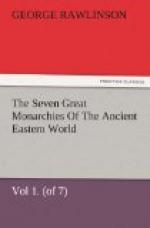The monarchy which we have had under review is one, no doubt, rather curious from its antiquity than illustrious from its great names, or admirable for the extent of its dominions. Less ancient than the Egyptian, it claims the advantage of priority over every empire or kingdom which has grown up upon the soil of Asia. The Arian, Turanian, and even the Semitic tribes, appear to have been in the nomadic condition, when the Cushite settlers in Lower Babylonia betook themselves to agriculture, erected temples, built cities, and established a strong and settled government. The leaven which was to spread by degrees through the Asiatic peoples was first deposited on the shores of the Persian Gulf at the mouth of the Great River; and hence civilization, science, letters, art, extended themselves northward, and eastward, and westward. Assyria, Media, Semitic Babylonia, Persia, as they derived from Chaldaea the character of their writing, so were they indebted to the same country for their general notions of government and administration, for their architecture, their decorative art, and still more for their science and literature. Each people no doubt modified in some measure the boon received, adding more or less of its own to the common inheritance. But Chaldaea stands forth as the great parent and original inventress of Asiatic civilization, without any rival that can reasonably dispute her claims. The great men of the Empire are Nimrod, Urukh, and Che-dor-laomer. Nimrod, the founder, has the testimony of Scripture that he was “a mighty one in the earth;” “a mighty hunter;” the establisher of a “kingdom,” when kingdoms had scarcely begun to be known; the builder of four great and famous cities, “Babel, and Erech, and Accad, and Calneh, in the land of Shinar,” or Mesopotamia. To him belong the merit of selecting a site peculiarly fitted for the development of a great power in the early ages of the world, and of binding men together into a community which events proved to possess within it the elements of prosperity and permanence. Whether he had, indeed, the rebellious and apostate character which numerous traditions, Jewish, Arabian, and Armenian, assign to him; whether he was in reality concerned in the building of the tower related in the eleventh chapter of the Book of Genesis, we have no means of positively determining. The language of Scripture with regard to Nimrod is laudatory rather than the contrary; and it would seem to have been from a misapprehension of the nexus of the Mosaic narrative that the traditions above mentioned originated. Nimrod, “the mighty hunter before the Lord,” had not in the days of Moses that ill reputation which attached to him in later ages, when he was regarded as the great Titan or Giant, who made war upon the gods, and who was at once the builder of the tower, and the persecutor who forced Abraham to quit his original country. It is at least doubtful whether we ought to allow any weight at all to the additions and embellishments with which later writers, so much wiser than Moses, have overlaid the simplicity of his narrative.




